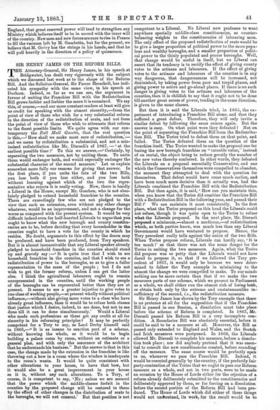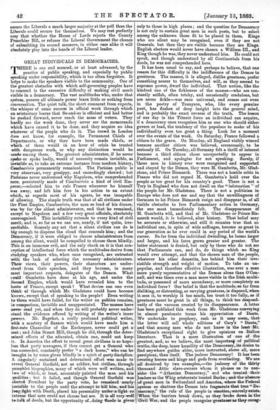SIR HENRY JAMES ON THE REFORM BILLS.
THE Attorney-General, Sir Henry James, in his speech at Bridgwater, has dealt very vigorously with the subject which we discussed last week as to the shape of the Reform Bill. And the Solicitor-General, Sir Farrer Herschell, has indi- cated his sympathy with the same view, in his speech at Durham. Indeed, so far as we can see, the argument in favour of uniting the Franchise Bill with the Redistribution Bill grows feebler and feebler the more it is examined. We say this, of course,—and our more constant readers at least will give us credit for speaking with the utmost sincerity,—from the point of view of those who wish for a very substantial reform in the direction of the redistribution of seats, and not from the point of view of those who wish to attenuate that reform to the finest possible limits. We quite agree with our con- temporary the Ball Mall Gazette, that the real question is this,—' How shall we make most sure of redistribution,'— and we mean by redistribution a substantial, and not a min- imised redistribution like Mr. Disraeli's of 1867, — at the earliest possible time ?' To this we answer,—' Certainly, by separating the two measures, not by uniting them. To unite them would endanger both, and would especially endanger the substantial character of the second measure.' Let us explain somewhat more fully our reasons for giving that answer. In the first place, if you unite the fate of the two Bills, you lose both if you lose either, and you lose both without learning against which of the two the repre- sentative who rejects it is really voting. Now, there is hardly a Liberal in the House, except Mr. Goschen, who is not abso- lutely pledged to extend household franchise to the counties. There are exceedingly few who are not pledged to the view that such an extension, even without any other change whatever, would be an improvement, and not a change for the worse as compared with the present system. It would be very difficult indeed even for half-hearted Liberals to argue that you ought to know what the new borough and county constitu- encies are to be, before deciding that every householder in the counties ought to have a vote for the county in which he resides. No doubt, arguments to this effect by the dozen may be produced, and have been produced, from Tory speakers. But it is almost inconceivable that any Liberal speaker already pledged to household franchise in the counties should stand
up and gravely say It is quite true that I wish to see household franchise in the counties, and that I wish to see a redistribution of power in the boroughs, so as to give a fuller representation to the mass of the people ; but I do not wish to get the former reform, unless I can get the latter also. I think the agricultural labourers ought to remain unrepresented in the counties, until the working people of the boroughs can be represented better than they are at present. It seems to me a greater injustice to give votes to one class of working people,—at present wholly without political influence,—without also giving more votes to a class who have already great influence, than it would be to refuse both classes that justice which I desire, indeed, to see done, but not to see done till it can be done simultaneously.' Would a Liberal who made such professions as these get any credit at all for sincerity in his reforming principles ? It may be perfectly competent for a Tory to say, as Lord Derby himself said in 1866,—" It is as insane to sanction part of a scheme, without knowing the whole, as it would be to begin building a palace room by room, without an estimate or a general plan, and with only the assurance of the architect that he understands his business." But the answer is that in this case, the change made by the extension in the franchise is like throwing out a bow in a room where the window is inadequate to the room's wants. It would be quite consistent with other alterations to your house, to have that bow, but it would also be a great improvement in your house as it is, without any such alterations. To a Tory, of course, it is competent to say, 'No ; unless we are assured that the power which the middle-classes forfeit in the counties by the proposed change will be restored to them by the effect of other changes in the distribution of seats to the boroughs, we will not consent.' But that position is not competent to a Liberal. No Liberal now professes to want. anywhere specially middle-class constituencies, as counter- balancing weights to the constituencies of labouring men. The only effect of the proposed redistribution of seats would be to give a larger proportion of political power to the more popu- lous and wealthy boroughs, and a smaller proportion of politi- cal power to the thinly populated and poorer boroughs. Well, that change would be useful in itself, but no Liberal can assert that its tendency is to rectify the effect of giving county votes to the artisans and labourers. If the effect of giving votes to the artisans and labourers of the counties is in any way dangerous, that dangerousness will be increased, not diminished, by taking power from poor and torpid places, and giving power to active and go-ahead places. If there is no such danger in giving votes to the artisans and labourers of the counties, then it is childish to say that it ought not to be done till another great access of power, tending in the same direction, is given to the same classes.
But then it is said the Liberals tried, in 1866, the ex- periment of introducing a Franchise Bill alone. and that they suffered a great defeat. Therefore, they will only invite a similar defeat by following the same course again. But the answer is easy. On what point were they defeated ? Not on the point of separating the Franchise Bill from the Redistribu- tion Bill. The Tories tried to defeat them on that point., and failed. The Tories defeated them on the question of the franchise itself. The Tories wanted to make the proposal one for basing the new borough franchise on " rateable value," instead of on rental, the object being to reduce greatly the number of the new votes thereby conferred. In other words, they defeated the Liberals on a proposal essentially Conservative, and one which the Conservatives themselves were compelled to abandon, the moment they attempted to deal with the question for themselves. That defeat would have come much earlier, and have been much more decisive than it actually was, had the- Liberals combined the Franchise Bill with the Redistribution. Bill. But then again, it is said, ' How can you maintain this, when you know that the Tories did combine the Franchise Bill with a Redistribution Bill in the following year, and passed their Bill ?' We can maintain it most consistently. In the first place, what the Tories proposed on this head the Liberals could not refuse, though it was quite open to the Tories to refuse what the Liberals proposed. In the next place, Mr. Disraeli proposed a minimum,—almost a modicum,—of redistribution which, as both parties know, was much less than any Liberal Government would have ventured to propose. Hence, the Tory precedent really tells against-the union of the two Bills. When Tories propose reform, Liberals can hardly say, ' It is too much !' so that there was not the same danger for the Tories in uniting the two measures. Again, what the Tories did propose was so petty that the Liberals would not have dared to propose it, so that if we followed the Tory pre- cedent of 1867, it would only be because we were deter- mined to follow the Tory example in minimising to the utmost the change we were compelled to make. To our minds nothing can be more certain than that if we make the twe measures parts of one scheme, which we present to Parliament as a whole, we shall either run the utmost risk of losing both, or obtain both only by the extreme and unstatesmanlike in- sufficiency of the second, i.e., the redistribution measure.
Sir Henry James has shown by the Tory example that there- is no pretence at all for the supposition that if the Franchise- Bill is passed in one Session, a dissolution must take place- before the scheme of Reform is completed. In 1867, Mr. Disraeli passed his Reform Bill in a very incomplete con- dition. A Boundaries Bill was absolutely essential, before it could be said to be a measure at all. Moreover, the Bill as passed only extended to England and Wales, and the Scotch and Irish measures were postponed. In 1868, the Liberals allowed Mr. Disraeli to complete his measure, before a dissolu- tion took place ; nor did anybody pretend that it was essen-
tial to consult the new constituencies created, before rounding off the measure. The same course would be perfectly open to us, whenever we pass the Franchise Bill. Indeed, it would be resented generally by the country, if the perfectly fair party-contention of the Tories that we ought to pass our Reform measure as a whole, and not in two parts, were to be made an occasion by the House of Lords either for the rejection of a reform already deliberately submitted to the constituencies and deliberately approved by them, or for forcing on a dissolution before the second portion of the Reform Bill had been pro- duced. The House of Lords which did either of these things would not understand, its work, for the result would be to secure the Liberals a much larger majority at the poll than the Liberals could secure for themselves. We may rest perfectly easy that whether the House of Lords rejects the County Franchise Bill, or refuses the Liberal Government the chance of submitting its second measure, in either case alike it will absolutely play into the hands of the Liberal leader.



































 Previous page
Previous page